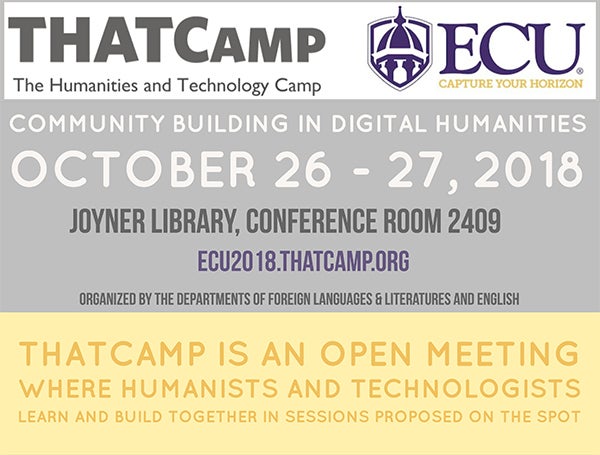The Humanities and Technology Camp Schedule
 Friday, October 26
Friday, October 26
Marylaura Papalas, ECU “Digital Magazine for Literature & Art”
Juan Escourido, ECU “Medieval Marginalia and Teaching Today. Experiences with Hypothes.is”
Nathan Kelber, UNC CH “Please Join Us! The Triangle Digital Humanities Network and Institute”
Elizabeth LaFave, ECU “Reading’ Fashion in A. Pushkin’s “Eugene Onegin” using Omeka
Irina Swain, ECU “Digital Barcelona Project” using Omeka
Lucia Binotti, UNC CH “Amirabilia, the First Location Based Platform for Experiential Education”
Study Room 2205, Facilitator Donna Kain. Topic________________________________
Study Room 2206, Facilitator Irina Swain. Topic_________________________________
Study Room 2207, Facilitator Juan Escourido. Topic______________________________
Discussion: Future of DISSH
Dr. Lucia Binotti, Professor of Spanish, University of North Carolina at Chapel Hill “Experimental Humanities. The Revolutionary Future of Education”
Study Room 2205, Facilitator Donna Kain. Topic________________________________
Study Room 2206, Facilitator Irina Swain. Topic_________________________________
Study Room 2207, Facilitator Laurie Godwin. Topic______________________________
Study Room 2205, Facilitator Juan Escourido. Topic_____________________________
Study Room 2206, Facilitator Katy Webb. Topic_________________________________
Study Room 2207, Facilitator Donna Kain. Topic________________________________
Summary of the day, Joyner Library 2409
Group Dinner Downtown
Saturday, October 27
Conference Room 3321, Virtual Reality demo (Irina Swain)
About the Workshops
About the Keynote Speaker
Dr. Lucia Binotti is a cultural historian, an X-Humanist and an EdTech entrepreneur whose most recent academic work focuses on mapping the institutional and curricular implications of integrating emerging-technologies as methodological and experimental tools for the advancement of the new Humanities. Binotti teaches about Intellectual History, Cultural and Socio-Linguistics, and the Renaissance. Her books and articles are recognized for close analysis of the printed communication that evolved in response to technological advances during the early modern period in Italy and Spain, and as cultural discussions about how the printing press changed learning, thinking, and culture in the Early Modern period.
In 2003, Binotti designed and has since directed one of the country’s top-ranked study abroad programs, the Honors Carolina Summer Renaissance in Rome, renowned for its unique technology enabled pedagogy and its rigorously classic yet fully experiential curriculum. In 2011, Gnovis—Binotti’s project on data visualization for Humanities research—was awarded an NEH Digital Innovation Startup grant. Her socially engaged digital socio-linguistics project Entiendelo was supported by a Mellon Digital Innovations Grant in 2014.
Binotti is the founder of two EdTech startups. RoadAmico (2014-2018) was a web-based platform that added a digital spatial dimension and digital co-collaborative features to sets of conventionally organized learning materials. Amirabilia is the world’s first adventure-based learning platform for experiential education. Amirabilia harnesses the power of emerging technologies to create immersive learning environments and builds unparalleled geo-located learning adventures that bring real-world and digital objects, places, and people to life.
